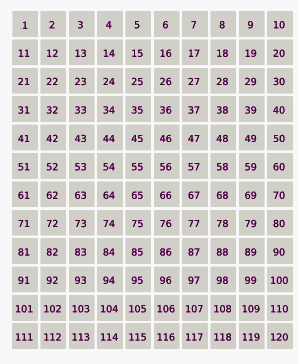Lucky number
In number theory, a lucky number is a natural number in a set which is generated by a certain "sieve". This sieve is similar to the Sieve of Eratosthenes that generates the primes, but it eliminates numbers based on their position in the remaining set, instead of their value (or position in the initial set of natural numbers).
The term was introduced in 1956 in a paper by Gardiner, Lazarus, Metropolis and Ulam. They suggest also calling its defining sieve, "the sieve of Josephus Flavius"[1] because of its similarity with the counting-out game in the Josephus problem.
Lucky numbers share some properties with primes, such as asymptotic behaviour according to the prime number theorem; also, a version of Goldbach's conjecture has been extended to them. There are infinitely many lucky numbers. However, if Ln denotes the n-th lucky number, and pn the n-th prime, then Ln > pn for all sufficiently large n.[2]
Because of these apparent connections with the prime numbers, some mathematicians have suggested that these properties may be found in a larger class of sets of numbers generated by sieves of a certain unknown form, although there is little theoretical basis for this conjecture. Twin lucky numbers and twin primes also appear to occur with similar frequency.
The sieving process
| Begin with a list of integers starting with 1: | ||||||||||||||||||||||||
| 1 | 2 | 3 | 4 | 5 | 6 | 7 | 8 | 9 | 10 | 11 | 12 | 13 | 14 | 15 | 16 | 17 | 18 | 19 | 20 | 21 | 22 | 23 | 24 | 25 |
| Every second number (all even numbers) in the remaining list is eliminated, leaving only the odd integers: | ||||||||||||||||||||||||
| 1 | 3 | 5 | 7 | 9 | 11 | 13 | 15 | 17 | 19 | 21 | 23 | 25 | ||||||||||||
| Every third number which remains in the list is eliminated; which starts with 5 (also note that the second term in this sequence is 3): | ||||||||||||||||||||||||
| 1 | 3 | 7 | 9 | 13 | 15 | 19 | 21 | 25 | ||||||||||||||||
| Every seventh remaining number is eliminated; which starts with 19 (the next surviving number is now 7): | ||||||||||||||||||||||||
| 1 | 3 | 7 | 9 | 13 | 15 | 21 | 25 | |||||||||||||||||

One way that the application of the procedure differs from that of the Sieve of Eratosthenes is, for n being the number being multiplied on a specific pass, the first number eliminated on the pass is the n-th remaining number that has not yet been eliminated, as opposed to the number 2n. That is to say that the numbers this sieve counts through is different on each pass (for example 1, 3, 7, 9, 13, 15, 19... on the third pass), whereas in the Sieve of Eratosthenes, the sieve always counts through the entire original list (1, 2, 3...).
When this procedure has been carried out completely, the remaining integers are the lucky numbers:
- 1, 3, 7, 9, 13, 15, 21, 25, 31, 33, 37, 43, 49, 51, 63, 67, 69, 73, 75, 79, 87, 93, 99, 105, 111, 115, 127, 129, 133, 135, 141, 151, 159, 163, 169, 171, 189, 193, 195, 201, 205, 211, 219, 223, 231, 235, 237, 241, 259, 261, 267, 273, 283, 285, 289, 297, ... (sequence A000959 in the OEIS).
The lucky number which removes n from the list of lucky numbers is: (0 if n is a lucky number)
Lucky primes
A "lucky prime" is a lucky number that is prime. They are:
- 3, 7, 13, 31, 37, 43, 67, 73, 79, 127, 151, 163, 193, 211, 223, 241, 283, 307, 331, 349, 367, 409, 421, 433, 463, 487, 541, 577, 601, 613, 619, 631, 643, 673, 727, 739, 769, 787, 823, 883, 937, 991, 997, ... (sequence A031157 in the OEIS).
It is not known whether there are infinitely many lucky primes.
See also
References
- ↑ Gardiner, Verna; Lazarus, R.; Metropolis, N.; Ulam, S. (1956). "On certain sequences of integers defined by sieves". Mathematics Magazine. 29 (3): 117–122. doi:10.2307/3029719. ISSN 0025-570X. Zbl 0071.27002.
- ↑ Hawkins, D.; Briggs, W.E. (1957). "The lucky number theorem". Mathematics Magazine. 31 (2): 81–84, 277–280. doi:10.2307/3029213. ISSN 0025-570X. Zbl 0084.04202.
Further reading
- Guy, Richard K. (2004). Unsolved problems in number theory (3rd ed.). Springer-Verlag. C3. ISBN 978-0-387-20860-2. Zbl 1058.11001.
External links
- Peterson, Ivars. MathTrek: Martin Gardner's Lucky Number
- Weisstein, Eric W. "Lucky Number". MathWorld.
- Lucky Numbers by Enrique Zeleny, The Wolfram Demonstrations Project.
- Symonds, Ria. "31: And other lucky numbers". Numberphile. Brady Haran.